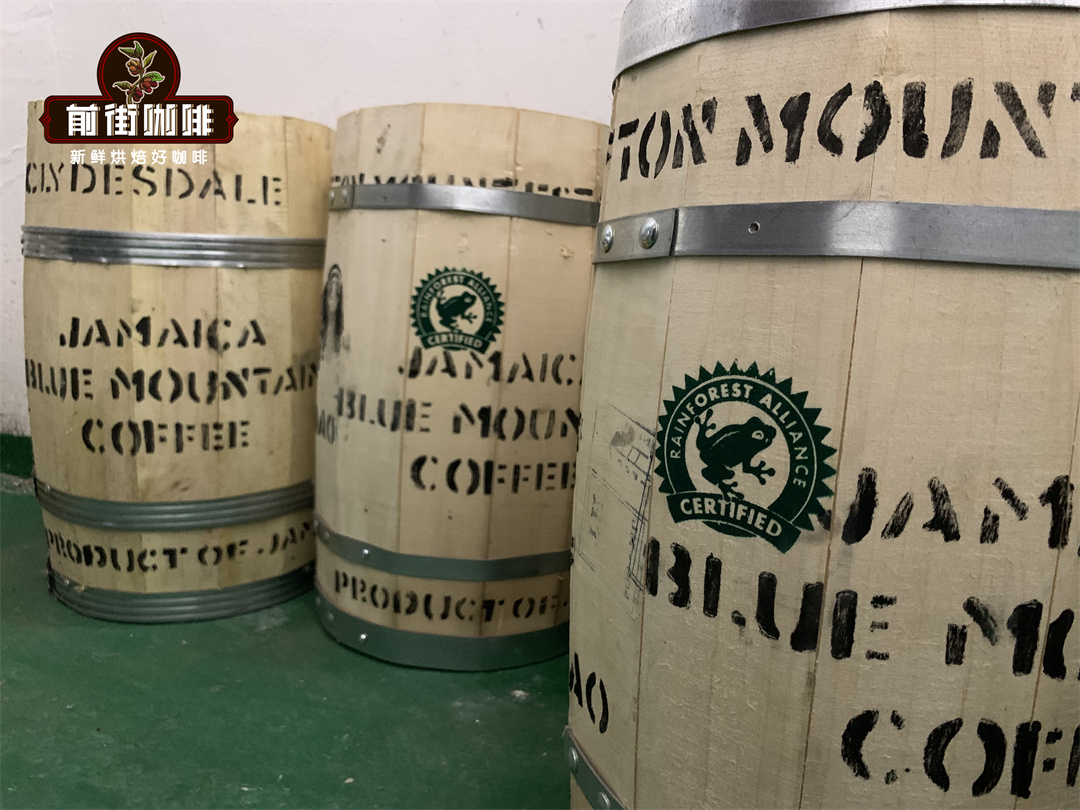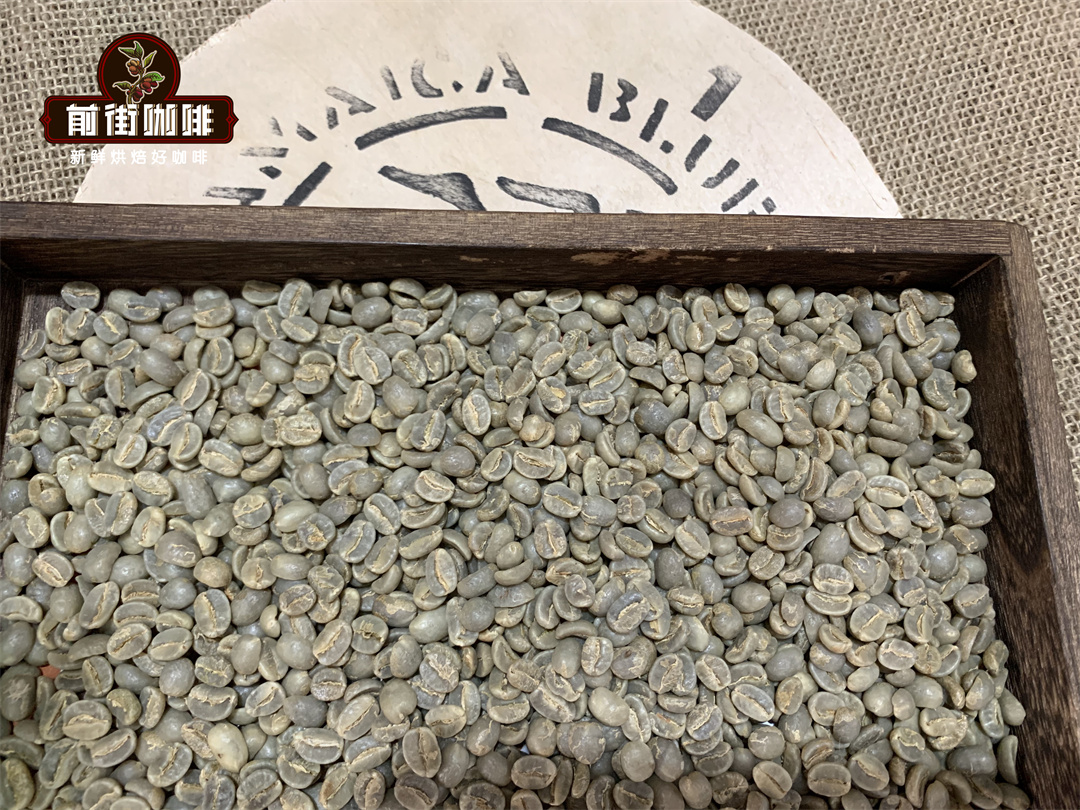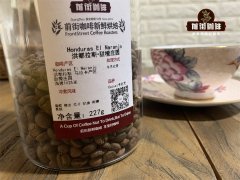What is Blue Mountain Coffee? Is Blue Mountain Coffee Rainforest Alliance Certified Coffee?
When I first came to Qianjie Coffee, when I first came into contact with coffee, it all started with Qianjie's entry-level rations of beans, such as Yega Xuefei's sour, Brazilian and Colombian Cymbidium's nut flavors, Mantenin's herbs and Yunnan's small grains of tea. In the Qianjie coffee roaster, one morning the roaster made a pot of coffee to the boss of Qianjie, and fortunately I had a cup, too. For me, who didn't know much about coffee at that time, I thought it was very delicious, so I could only use amazing words to describe it. Since I was at the entry level at that time, it was not too poor to use words, but because of such an episode, I fell in love with it at once, right. It is the Blue Mountain Coffee we are going to talk about today.
Coffee drinkers must know Blue Mountain Coffee. Many people must have heard of the famous Blue Mountain Coffee even if they never drink it. Do you know why Blue Mountain Coffee is famous? Qianjie Coffee will introduce this precious coffee to you today.
There is fertile volcanic soil in the blue mountain coffee growing area, which provides a rich material basis for the growth of coffee trees. Clifton Manor is the only one in the Blue Mountain growing area with rainforest certification.

Rainforest certified coffee
There is an obvious frog on the rainforest certification logo, rainforest alliance certified coffee, or "frog bean" for short. "Rainforest Alliance" RA (Rainforest Alliance) certification refers to a farm that meets the standards set by the Rainforest Alliance, which protects the farm and its surrounding ecosystem, imposes some restrictions on the use of pesticides, and evaluates benchmarks such as waste management. Only coffee that has been evaluated and certified can be called "Rainforest Alliance certified coffee". The traditional farming method cultivated in the shade of primary forest is used, which is beneficial to the protection of the ecosystem. Some of the proceeds from the alliance are also used for the protection of wildlife in tropical rainforest animal reserves and the improvement of workers' living standards.
What kind of coffee can be called Blue Mountain Coffee?
The definition of Blue Mountain coffee is very strict. Just as wine is distinguished by estate or variety, coffee produced in only one region of Jamaica can be called this name.
The legal growing area of Blue Mountain Coffee is on the eastern side of the island of Jamaica. It can be called Jamaican Blue Mountain Coffee (Jamaica Blue Mountain) only if it is grown in the areas of Saint Andrew, Saint Thomas, Portland and Saint Mary at an altitude of 1000-1600 meters. You may wonder why you don't plant it any more, because areas above 1700 meters are ecological forest reserves in the country, and coffee beans are prohibited by law.
Coffee grown between 450m and 900m in height is called "Jamaica High Mountain", while those below this range are called "Jamaica Supreme" or "Jamaica Low Mountain". Only about 25% of the coffee beans in Jamaica are known as Blue Mountain Coffee.

The good wine in the barrel
The packaging of Blue Mountain Coffee is very special and it is one of the few producing areas in the world that still use wooden buckets. The barrel is covered with an approved official seal, and the material is specially treated to ensure that it is dry, unsqueezed and tasteless. The barrel can ensure the quality of raw coffee beans in the process of transportation, which is selected from production cost, transportation cost and preservation quality. At present, the coffee beans we are familiar with are made of cheaper and mass-produced linen bags, although there is nothing wrong with the sacks, but when the blue mountain coffee beans in wooden barrels come into their hands, the satisfaction after waiting is still quite sweet. it can be said that this laborious and laborious packaging also illustrates the status of blue mountain coffee beans in people's hearts.
Jamaica Blue Mountain Coffee is graded into four levels, from No.1 to No.3, and finally to PB (hand-selected round beans). The most advanced blue mountain No.1 standard is beans with more than 17 mesh, with a defect rate of less than 3% and a moisture content of about 13%.
What's so good about Blue Mountain Coffee?
Even if you have never had Blue Mountain Coffee, you must have heard of its value.
Blue Mountain Coffee can have this imperial treatment because of its outstanding aroma and sweetness. The coffee produced here has a delicate and unique flavor, starting with a mild and smooth taste that stretches continuously after entering the throat. Then there is the elegant and mature aroma, with a little woody flavor, and the balanced distribution of sweet, sour and bitter enhances the hierarchical sense of drinking tea in the mouth. The Blue Mountain covers all the performances of good coffee, which is why it has always been so popular.
In addition, since the legal planting area of Blue Mountain Coffee is very small, with a total area of no more than 6100 hectares, this will of course lead to limited production. Coupled with the steep terrain of the high mountains, all coffee beans have to be picked manually by local skilled farmers, which also increases the cost.
The last factor has to go back to the historical story.
Because the coffee industry in Jamaica had a period of unstable quality, it was not until the 1980s when Japan invested in introducing ecological cultivation and treatment quality control into Jamaica that Blue Mountain became a world-famous synonym for fine coffee beans. The trade friendship between the two countries has given Japan the right of preemption, with only 10% of the total available to the rest of the world.
Therefore, whether you can drink authentic Blue Mountain coffee depends on luck and financial resources. Things are scarce, and good quality plus rarity makes every batch of coffee a rare commodity. On the other hand, in the front street coffee, you can drink authentic Blue Mountain coffee, and it is not expensive to go through the most important baking process after getting raw beans. The quality of roasted beans is definitely a multiple advantage for good beans. If you have a chance to have an authentic Blue Mountain No.1, it must be quite enjoyable.
Important Notice :
前街咖啡 FrontStreet Coffee has moved to new addredd:
FrontStreet Coffee Address: 315,Donghua East Road,GuangZhou
Tel:020 38364473
- Prev

What is the most important key factor in making perfect hand-brewed coffee?
Every coffee lover has a knack for making coffee, whether it's the first choice of coffee beans, the way to heat water, or the utensils used. While some people don't give up good old cloth filters, others prefer modern espresso machines or hand-filtered coffee. Hand coffee, more and more people accept and like it, more winners like it to the point of madness, why?
- Next

Sweet orange manor washing kaduai coffee beans sweet orange manor coffee beans suitable for roasting
Have you ever had coffee from Honduras? This Central American country, Honduras, is no less than several coffee varieties in the bean list of Qianjie Coffee, including Honduran Shirley Whiskey barrel-treated coffee, which is already familiar to Qianjie coffee fans, as well as Litchi Orchid Coffee and Sweet Orange Coffee. A barrel of whisky with too much front street coffee
Related
- What brand of black coffee is the most authentic and delicious? what are the characteristics of the flavor of the authentic Rose Summer Black Coffee?
- Introduction to the principle and characteristics of the correct use of mocha pot A detailed course of mocha pot brewing coffee is described in five steps.
- Which is better, decaf or regular coffee? how is decaf made?
- How much is a bag of four cat coffee?
- How about four Cat Coffee or Nestle Coffee? why is it a cheap scam?
- Which is better, Yunnan four Cats Coffee or Nestle Coffee? How about cat coffee? is it a fake scam? why is it so cheap?
- How about Cat Coffee? what grade is a hoax? which instant coffee tastes better, four Cat Coffee, Nestle Coffee or G7 coffee?
- Process flow chart of coffee making-Starbucks coffee making process what coffee tastes good at Starbucks
- The top ten best coffee beans in the world Rose summer coffee or Tanzanian coffee tastes good
- Yunnan four cat coffee is good to drink?_four cat coffee is a big brand? four cat blue mountain coffee is fake?

